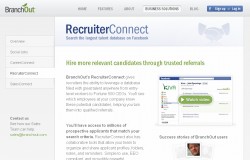As LinkedIn’s annual user conference got underway in Las Vegas today, it took on an import that goes well beyond the quality of the agenda. This is its first conference since becoming a public company and the first since its dominance as the Internet’s leading business network was challenged — directly or otherwise — by such powerful brands as Google, Facebook, and Monster.
The sessions the company has planned for the three-day event are heavy on the training with a strong mix of sessions devoted to recruiting strategies and social media. The speaker lineup is first rate and the agenda promised enough variety and practicums that it should be easy enough to answer the boss’s “What did you learn?” questions.
On another level, though, the conference is spectacle, a physical manifestation of the reach LinkedIn has achieved into the recruiting world in just a few years. Founded as a sales and marketing leads business, LinkedIn has morphed into a jobs-focused social network. Today half its revenue — approaching $500 million — comes from recruiters.
But in just the five months since LinkedIn went public in May the world has changed.
Google launched a social network, Monster launched BeKnown, a careers network, BranchOut, a startup careers network, announced a partnership with CareerBuilder, and, perhaps most significant of all, Facebook detailed sweeping changes to its 800-million-user social network that could trump the need for a separate business network altogether. Monster and BranchOut both built their career networks on the Facebook platform, leveraging the enormous traffic and engagement that the site enjoys. Both sites connected with LinkedIn as well. Even as it climbed past 2 million users, BranchOut managed to avoid problems with LinkedIn. Monster’s BeKnown, however, triggered a prompt rebuke from LinkedIn, which shut out both sites and some other, minor players. That didn’t keep either site from growing — BeKnown is now around 3 million registered users. It might, however, have marginalized them, since Facebook users tend not to provide detailed job histories and skill lists. Then, just a few weeks ago, Facebook rearranged the landscape, unveiling its biggest overhaul since breaking away from the college campuses that gave it life.
Part of this overhaul is to encourage users to share more details about their life and background, especially their career and educational experience. Chris Merritt, BranchOut’s GM of enterprise and VP of sales, pretty much shrugged off the LinkedIn dust-up when I spoke with him last week. Fewer than 20 percent of BranchOut users, he said, came to the site through LinkedIn. BeKnown’s project manager Tom Chevalier said even without the LinkedIn connection the number of users has reached 2.8 million monthly unique visitors registrants. The network is continuing to grow.
Up to now, the Achilles heel with the Facebook connection has been that it’s the place for socializing and not for careers. I’ve heard all sorts of numbers about how many Facebook users have entered what might be considered career information. None are entirely reliable, although the most reasonable came from a researcher who told me in a private conversation that many people enter just a school or their most current place of work. For that reason, LinkedIn is the place for recruiters to source candidates. Yes, recruiters are all over Facebook. As are the companies they work for. Yes, talent communities are being formed on Facebook even as you read this. And plenty of companies have well-developed pipelines with active conversations. Yet most of what passes for recruiting on Facebook is the posting of jobs. LinkedIn users, however, can be searched, sourced, and contacted by recruiters.
That was the state of affairs when LinkedIn went public in May and saw its stock shoot up to almost $123. It has since settled back, and was trading today around $86 a share. Soon, it will report its third-quarter financials. Analyst estimates are that the company’s revenue will approach the North American revenues of Monster and CareerBuilder.
Today, as LinkedIn Talent Connect kicks off, the company’s first major event since going public in May, it faces challenges to its favored place with recruiters. BranchOut’s Merritt said that “north of 75 percent of our profiles have education and work history.” That includes not only the BranchOut direct connections; 75 percent of their friends have detailed profiles, too.
As Facebook implements its Timeline and other parts of the so-called open graph, he said profiles will grow much more detailed. “Facebook is crowdsourcing more and more of your background,” he observed. 
Months ago BranchOut introduced RecruiterConnect, the first tool for recruiters to easily source candidates and get referrals through the site. It hasn’t officially launched yet, but it’s coming. BeKnown, too, has product enhancements on the way. Badges are popular, and there’s likely to be more development around them. One certainty for development, says Chevalier, is company participation.
The next six months for BeKnown, he says, will be to learn “what drives frequent engagement with your career and for us to develop better tools to help do that.”